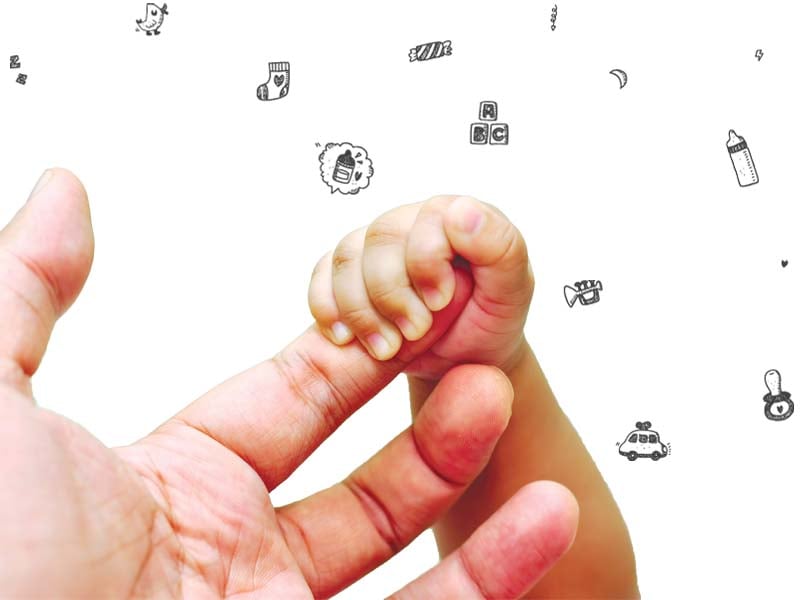
Gone are the days when babies were the sole responsibility of their mothers. Men now want to be involved from the very start. They want to be equal partners when it comes to parenting and many feel pride in helping with the feeding and changing.
However, it isn’t always clear to new fathers how they should bond with their babies. Especially in the initial months, when the infant seems to want only the mother, fathers often lose out on building a sound attachment with them. According to Helen Hans, a researcher and postnatal leader with the UK’s National Childcare Trust, new fathers often feel like there is too little interaction between them and the baby. “By being attentive to the small details and nuances, dads can get a lot of satisfaction and benefit from communicating and caring for the baby,” she explains.
Helen’s theory is lent credence by new-father Shiham Khan who felt everything but love upon first seeing his daughter. “When they put her into my arms, I remember feeling excitement and relief,” he says. “But I just didn’t feel the one emotion I had been looking forward to most: love at first sight. It took me nearly eight weeks to realise that father-baby bonding works differently compared to the mother-child connection.”
An important thing to consider here is that the very nature and fabric of father-child interaction is completely different. Hence, it is futile to expect the two to bond as quickly. Mother of three Khaula Shah shares her own experiences. “When it comes to teaching children new words or reading books to them, it’s always me. I am also more updated about their interests at each stage,” she says. “My husband, however, takes cue and improvises. He enjoys sports-related things so we let that be his special bonding style.”
In an article titled ‘Father’s Time’, published by renowned online portal Psychology Today, journalists Paul Robert and Bill Moseley elaborate on this further. They claim that while mothers relate to their babies in a more soothing, loving and serious sort of way, fathers interact in a more physical and playful manner, relying on activities, humour and excitement. Khaula’s husband, for instance, has been taking their youngest to the park every day for the past three months. “As my son is growing, he has started to look forward to his special time with baba,” says Khaula. This provides unique insight into how fathers can begin to bond with their children, in a way not only unique to their own personalities but also beneficial for the development of the child. Muhammed Omer, a father of a two year old has his own special songs that he has been singing to his son since the day he was born. “Even today he calls them ‘daddy’s songs’ and asks for them before sleeping,” says Muhammed. “In fact, even when I am away on a business trip, I actually have to call him and sing them over the phone,” he adds.

Kyle Pruett, a professor of psychiatry at the Yale Child Study Centre, points out that new fathers even hold their children differently, with a different kind of patience and frustration cycle than mothers. These findings reveal a distinctive and personalised way in which fathers can bond — playing games with them, indulging in activities such as piggy back rides, tickling, wrestling, swinging or going out for walks while carrying the baby on their shoulders. All of these allow fathers to enjoy themselves in a special way, making it possible for the babies to associate fun, laughter and play with them. For instance, Pooya Dubash, father of a three month old girl, bonds with his daughter through excercise routine. “I hold her in my arms and do lunges. Sometimes, I even use her as weights to work on my triceps,” says Pooya. “It helps me spend more time with her and get my work-out done as well,” he adds. This is, of course, not to say that they consider mothers boring. Women may do the same things but infants will always associate nurturing and comfort with them, before anything else. Or they simply use other ways to amuse the babies. Perhaps it is for this reason that several couples decide to allocate special play hours exclusive to the fathers.
For the connection to strengthen, it is important that the father gets some alone time with the baby. Jerrold Shapiro, professor of counselling psychology at Santa Clara University and author of The Measure of a Man: Becoming the Man You Wish Your Father Had Been, believes that fathers respond to the interactive qualities of children. “Until they start to sense something coming back from the child, many of them will not feel that bond or connection,” writes Jerrold. Their confidence and interest derives from the reactions they get from the baby in the form of smiles, laughter, different expressions and so on. The best way to achieve that is to spend quality time with the baby regularly and making oneself a part of their routine.
Whether it is playtime, walk-time, bottle-feeding, showering or putting them to bed, the father should do it independently. This signals to babies that mommy is not the only one who can take care of them and hence, they start to project feelings of dependency on the fathers as well. “When we became parents, my wife and I subconsciously settled into a very nice routine,” shares Munib Kaiser*, father of a new-born girl. “I would take the baby when I got home from work and took care of everything, from diaper changing to feeding, all the way until bedtime. For instance, she would even nap on my shoulders while I watched a movie.” During this time Munib’s wife would catch up on other things. This of course, brought Munib closer to the baby. “I think you can only really feel attached to someone once you take care of them and realise how much they need you or how happy you get when you see them smile,” he explains.
Research indicates that father-child bonding not only benefits the baby by developing his or her emotional intelligence, but also reduces the stress levels felt by the father. It also provides feeling of reward that comes with being an involved parent. Hence, their bonding should begin early on and continue to evolve through the different stages of the child’s life.
*Name has been changed to protect privacy
Mehreen Ovais is an alumna of Manchester Business School and Lahore University of Management Sciences. She is passionate about writing and journalism. She tweets as @mehreenovais
Published in The Express Tribune, Ms T, December 13th, 2015.




















1714024018-0/ModiLara-(1)1714024018-0-270x192.webp)























COMMENTS
Comments are moderated and generally will be posted if they are on-topic and not abusive.
For more information, please see our Comments FAQ